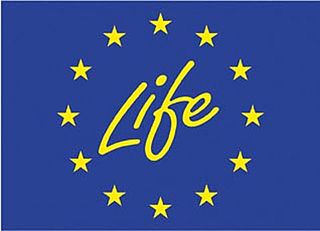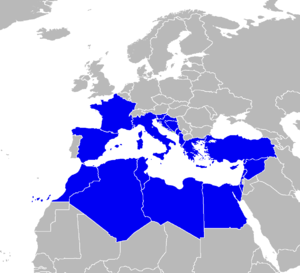
Environmental laws are laws that protect the environment. Environmental law is the collection of laws, regulations, agreements and common law that governs how humans interact with their environment. This includes environmental regulations; laws governing management of natural resources, such as forests, minerals, or fisheries; and related topics such as environmental impact assessments. Environmental law is seen as the body of laws concerned with the protection of living things from the harm that human activity may immediately or eventually cause to them or their species, either directly or to the media and the habits on which they depend.
The Protocol on Environmental Protection to the Antarctic Treaty, also known as the Madrid Protocol, is a complementary legal instrument to the Antarctic Treaty signed in Madrid on 4 October 1991. It entered into force on 14 January 1998.

The United Nations Environment Programme (UNEP) is responsible for coordinating responses to environmental issues within the United Nations system. It was established by Maurice Strong, its first director, after the United Nations Conference on the Human Environment in Stockholm in June 1972. Its mandate is to provide leadership, deliver science and develop solutions on a wide range of issues, including climate change, the management of marine and terrestrial ecosystems, and green economic development. The organization also develops international environmental agreements; publishes and promotes environmental science and helps national governments achieve environmental targets.

The terms international waters or transboundary waters apply where any of the following types of bodies of water transcend international boundaries: oceans, large marine ecosystems, enclosed or semi-enclosed regional seas and estuaries, rivers, lakes, groundwater systems (aquifers), and wetlands.
Integrated coastal zone management (ICZM), integrated coastal management (ICM), or integrated coastal planning is a coastal management process for the management of the coast using an integrated approach, regarding all aspects of the coastal zone, including geographical and political boundaries, in an attempt to achieve sustainability. This concept was born in 1992 during the Earth Summit of Rio de Janeiro. The specifics regarding ICZM is set out in the proceedings of the summit within Agenda 21, Chapter 17.

War can heavily damage the environment, and warring countries often place operational requirements ahead of environmental concerns for the duration of the war. Some international law is designed to limit this environmental harm.
Specially Protected Areas of Mediterranean Importance (SPAMI) are sites "of importance for conserving the components of biological diversity in the Mediterranean; contain ecosystems specific to the Mediterranean area or the habitats of endangered species; are of special interest at the scientific, aesthetic, cultural or educational levels".
This page covers environmental issues in Greece.
Framework Convention for the Protection of the Marine Environment of the Caspian Sea is a regional convention signed by the official representatives of the five littoral Caspian states: Azerbaijan, Iran, Kazakhstan, Russian Federation and Turkmenistan in Tehran (Iran) on 4 November 2003. The Framework Convention, also called Tehran Convention, entered into force on 12 August 2006.

The LIFE programme is the European Union's funding instrument for the environment and climate action. The general objective of LIFE is to contribute to the implementation, updating and development of EU environmental and climate policy and legislation by co-financing projects with European added value. LIFE began in 1992 and to date there have been five phases of the programme. During this period, LIFE has co-financed some 4600 projects across the EU, with a total contribution of approximately 6.5 billion Euros to the protection of the environment and of climate. For the next phase of the programme (2021–2027) the European Commission proposed to raise the budget to 5.45 billion Euro.
Safe Planet: the United Nations Campaign for Responsibility on Hazardous Chemicals and Wastes is the UN Environment Programme (UNEP) and UN Food and Agricultural Organization-led global public awareness and outreach campaign for ensuring the safety of human health and the environment against hazardous chemicals and wastes.
Ocean governance is the conduct of the policy, actions and affairs regarding the world's oceans. Within governance, it incorporates the influence of non-state actors, i.e. stakeholders, NGOs and so forth, therefore the state is not the only acting power in policy making. However, ocean governance is complex because much of the ocean is a commons that is not ‘owned’ by any single person or nation/state. There is a belief more strongly in the US than other countries that the “invisible hand” is the best method to determine ocean governance factors. These include factors such as what resources we consume, what price we should pay for them, and how we should use them. The underlying reasoning behind this is the market has to have the desire in order to promote environmental protection, however this is rarely the case. This term is referred to as a market failure. Market failures and government failures are the leading causes of ocean governance complications. As a result, humankind has tended to overexploit marine resources, by treating them as shared resources while not taking equal and collective responsibilities in caring for them.

Coastal & Marine Union (EUCC) is a nonprofit organization. It was founded in 1989 with the aim of promoting coastal management. In Europe, it had 13 national branches. EUCC's working area is Europe and its neighbouring regions, especially the Black Sea and the Mediterranean.

The Environmental Protection Agency, is an agency of Ministry, established by EPA Act 490 (1994). The agency is dedicated to improving, conserving and promoting the country's environment and striving for environmentally sustainable development with sound, efficient resource management, taking into account social and equity issues. It oversees the implementation of the National Environment Policy. EPA Ghana's mission is to manage, protect and enhance the country's environment and seek common solutions to global environmental problems. Its mission is to be achieved through an integrated environmental planning and management system with broad public participation, efficient implementation of appropriate programs and technical services, advice on environmental problems and effective, consistent enforcement of environmental law and regulations. EPA Ghana is a regulatory body and a catalyst for change to sound environmental stewardship.

The Marine Strategy Framework Directive is a European Directive aimed at achieving or maintaining Good Environmental Status (GES) in European seas by the year 2020.
Strategic environmental assessment (SEA) is a systematic decision support process aiming to ensure that environmental and possibly other sustainability aspects are considered effectively in policy, plan, and program making. In this context, following Fischer (2007) SEA may be seen as:

The Mediterranean Sea has been defined as one of the seas most affected by marine plastic pollution.
On February 29, 2024 the Greek Parliament passed a bill that relaxed coastal protection regulations. The bill, which was supported by the majority New Democracy party, passed with 158 votes in favor and 142 against. All eight opposition parties voted against the legislation.
The Convention for the Protection and Development of the Marine Environment of the Wider Caribbean Region, commonly called the Cartagena Convention, is an international agreement for the protection of the Caribbean Sea, the Gulf of Mexico and a portion of the adjacent Atlantic Ocean. It was adopted on 24 March 1983, entered into force on 11 October 1986 subsequent to its ratification by Antigua and Barbuda, the ninth party to do so, and has been ratified by 26 states. It has been amended by three major protocols: the Protocol Concerning Co-operation in Combating Oil Spills in the Wider Caribbean Region, the Protocol Concerning Specially Protected Areas and Wildlife to the Convention for the Protection and Development of the Marine Environment of the Wider Caribbean Region and the Protocol Concerning Pollution from Land-Based Sources and Activities to the Convention for the Protection and Development of the Marine Environment of the Wider Caribbean Region.









